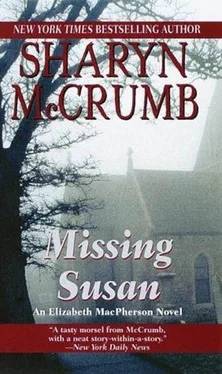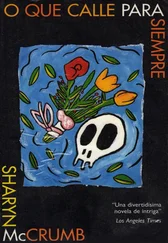Sharyn McCrumb - Missing Susan
Здесь есть возможность читать онлайн «Sharyn McCrumb - Missing Susan» весь текст электронной книги совершенно бесплатно (целиком полную версию без сокращений). В некоторых случаях можно слушать аудио, скачать через торрент в формате fb2 и присутствует краткое содержание. Жанр: Детектив, на английском языке. Описание произведения, (предисловие) а так же отзывы посетителей доступны на портале библиотеки ЛибКат.
- Название:Missing Susan
- Автор:
- Жанр:
- Год:неизвестен
- ISBN:нет данных
- Рейтинг книги:3 / 5. Голосов: 1
-
Избранное:Добавить в избранное
- Отзывы:
-
Ваша оценка:
- 60
- 1
- 2
- 3
- 4
- 5
Missing Susan: краткое содержание, описание и аннотация
Предлагаем к чтению аннотацию, описание, краткое содержание или предисловие (зависит от того, что написал сам автор книги «Missing Susan»). Если вы не нашли необходимую информацию о книге — напишите в комментариях, мы постараемся отыскать её.
Missing Susan — читать онлайн бесплатно полную книгу (весь текст) целиком
Ниже представлен текст книги, разбитый по страницам. Система сохранения места последней прочитанной страницы, позволяет с удобством читать онлайн бесплатно книгу «Missing Susan», без необходимости каждый раз заново искать на чём Вы остановились. Поставьте закладку, и сможете в любой момент перейти на страницу, на которой закончили чтение.
Интервал:
Закладка:
As their guide herded them back to the bus, they bolted into the roadside shop for an orgy of postcard purchasing, but since the store’s merchandise was limited and its floor space minuscule, they soon emerged and climbed back aboard with reasonable punctuality.
A few minutes later, before Susan had begun her nap or Frances had finished her first postcard, Rowan Rover was on the microphone again, calling their attention to an assortment of four-storied gray buildings across an expanse of fields on the left side of the road. “There it is, ladies and Charles,” he said with a dramatic hush in his voice. “With the gorse in bloom and the grass still summer green, it doesn’t look like such a forbidding place, I suppose. But one prisoner called it the Siberia of England. I assure you that winter on Dartmoor can be very bleak indeed.”
The tour members craned their necks for a better look at the circular granite compound, reminiscent of a nineteenth-century factory complex.
Rowan consulted his tour notes. “When I was at home this weekend, I found this quote in one of my reference books. It was written by a young American prisoner named Charles Andrews, kept here during the War of 1812. ‘You feel the cold of the place in your marrow. Driving rain comes through the windows, the wind rattles the slates, the walls are damp. In winter the place seems always under fog which penetrates everything. It has driven many a prisoner crazy…’ I expect all of that is still true today.”
“How old is it?” asked Charles Warren.
“It was built in the early 1800s to house prisoners from the Napoleonic wars,” said Rowan. “It has been modernized over the years, of course. I believe the chief problem now is overcrowding.”
“Does England have the death penalty?” asked Susan, looking up from her novel.
“No. It was abolished in the mid-Sixties.”
“Too bad. It would have solved the problem.” Susan went back to her book.
Bernard took a side road that enabled them to circle the prison and to come back out on the main road again. Charles and Elizabeth snapped photos from the moving coach, but the others seemed to lose interest in the prison after their first look. Rowan, too, was glad to leave the ominous compound behind. In another hour they would cross the River Tamar and go into Cornwall, where his attempts to murder would begin in earnest. Just after lunch, in fact.
Busy with his own thoughts about the remainder of the day, Rowan Rover left the group alone to doze or enjoy the scenery from Princetown to Tavistock, and for most of the way up to Launceston, where they would pick up the A30 that led all the way through the Cornish countryside to their destination in St. Ives. Just after Dunterton, though, when the road crossed the River Tamar, Rowan Rover’s sectarian feelings for his home province won out over his preoccupation with his personal plans and he felt compelled to infuse the group with enthusiasm about his native Cornwall.
“Cornwall has always been a place apart,” he began. “It is surrounded on three sides by the sea and cut off from neighboring Devon by the River Tamar, which we just crossed. But the separateness is more than mere geography. Until the eighteenth century, the people of Cornwall spoke another language as well. Old Cornish is a Celtic tongue, akin to Welsh and Breton.”
Susan Cohen rolled her eyes. “Oh, God! We’re going someplace where they don’t speak English?”
“On the contrary,” said Rowan Rover, holding in his temper with a deep breath. “English is all they speak. The Cornish language died out two hundred years ago. However, other traces of the ancient culture do survive. There are dolmens and great stone circles dotting the landscape. Holy wells, remnants of a pre-Christian faith, are found all over the countryside, and in the place names and the oral tradition, you can find the remnants of the old legends. One of the legends is the tale of King Arthur.”
“The Sword in the Stone,” said Kate Conway, whose acquisition of culture seemed entirely cinematic.
“Let us not forget Camelot and Excalibur , while we’re at it,” snapped Rowan. “However, for purposes of this tour, there are some less savory Cornish traditions that we should discuss. It was a culture of fishermen and seafarers, but others also depended on the sea for a living. I mean, of course, the smugglers and wreckers.”
“What are wreckers?” asked Frances, scanning the road for hot-rodders.
“Ship wreckers,” Rowan explained. “Back in the old days, any goods washed ashore from wrecks were considered common property, so a foundering ship would bring the entire village out to congregate on the beach, awaiting the storm-tossed booty. It was inevitable that sooner or later someone got the idea of helping ships to wreck. Tradition has it that they tied a lantern around a horse’s neck and led it along the cliffs, so that a ship would mistake its light for the lighthouse, and wreck on the rocks.”
“Nag’s Head,” murmured Elizabeth MacPherson. “That’s the name of a beach off the North Carolina coast. Apparently, the custom went to the colonies with the Cornish immigrants.”
Susan laughed. “So you’re descended from crooks?”
“Times were hard in those days,” said Rowan, ignoring the jibe. “Smugglers and wreckers made a better living than fishermen or those poor sods who worked in the Cornish tin mines. Anyhow, today we shall visit Jamaica Inn, a fabled haunt of these outlaws, and, although it isn’t on the schedule, I thought I might take you into some actual smugglers’ caves tomorrow.”
The mystery tourists looked doubtfully at each other. “Caves?” said Frances Coles.
Rowan gave her a magnanimous smile. “Yes. Won’t it be exciting?” Ignoring their uneasy glances, he went on. “Besides the tales of saints and giants, we have a few great villains as well.”
Alice MacKenzie raised her hand. “About these smugglers. Are there any precautions we ought to take?”
“They don’t do it anymore,” sighed Rowan, wondering if there were anything Americans wouldn’t believe. “That was in the eighteenth century. There aren’t any more robbers around here.”
From the driver’s seat came Bernard’s hearty laugh. “I dunno, Rowan. Have you seen the prices some of these places charge tourists?”
“I stand corrected,” said Rowan. “You will be robbed, but you will participate voluntarily, and to show for it you will have: postcards, cheaply turned-out horse brasses, souvenir key chains, and imitation shrimping nets, suitable for wall decoration.”
A few miles farther on, the scenery changed from tree-lined hills and lush green valleys to a treeless open moorland of gorse and bracken: Bodmin Moor. Bernard pulled the coach into a gravel parking lot next to a two-story gray building with a stone courtyard in front of it. “Jamaica Inn,” he announced. “Go and have lunch in the Smugglers’ Bar.” Turning to Elizabeth, he whispered, “The gift shop is right next door.”
“Oh, goody!” said Elizabeth, snatching up her purse.
“That’s right,” snapped Rowan. “Go and buy some horse brasses and Old Cornish tea towels!”
Elizabeth made a face at him. “I like shopping.”
“Well, don’t be too long about it,” said Rowan to the rest of the group. “After lunch, if anyone fancies a walk, I’ll take you to Dozmary Pool, and tell you the story of Jan Tregeagle.”
The tour members were delighted with the white-lettered inscription painted above the doorway to the old coaching inn: THROUGH THESE PORTALS PASSED SMUGGLERS, WRECKERS, VILLAINS, AND MURDERERS. BUT REST EASY… T’WAS MANY YEARS AGO.
“I wouldn’t be too sure about that,” muttered Rowan Rover, as he watched his charges taking each other’s pictures beneath the inscription.
Читать дальшеИнтервал:
Закладка:
Похожие книги на «Missing Susan»
Представляем Вашему вниманию похожие книги на «Missing Susan» списком для выбора. Мы отобрали схожую по названию и смыслу литературу в надежде предоставить читателям больше вариантов отыскать новые, интересные, ещё непрочитанные произведения.
Обсуждение, отзывы о книге «Missing Susan» и просто собственные мнения читателей. Оставьте ваши комментарии, напишите, что Вы думаете о произведении, его смысле или главных героях. Укажите что конкретно понравилось, а что нет, и почему Вы так считаете.












